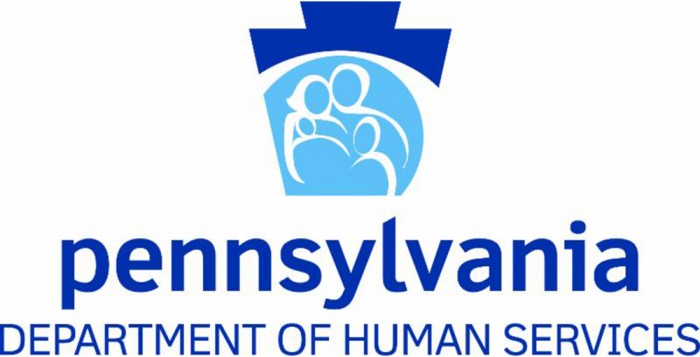FOR IMMEDIATE RELEASE
July 26, 2021
York, PA – Department of Human Services (DHS) Acting Secretary Meg Snead today joined York County President Commissioner Julie Wheeler, York City Mayor Michael Helfrich, Representative Carol Hill Evans, and Community Progress Council CEO Robin Rohrbauh to discuss the upcoming end of the federal eviction moratorium and urge Pennsylvanians at risk of eviction or utility shutoffs because of COVID-19 to apply for assistance available through the Emergency Rental Assistance Program (ERAP).
ERAP can help people who are facing eviction pay past due and upcoming rent or pay utility bills or other costs necessary to help them be safely housed. Pennsylvanians experiencing housing instability or at risk of eviction are strongly urged to begin their ERAP application as soon as possible and not wait until the eviction moratorium ends. The Centers for Disease Control and Prevention (CDC)’s federal moratorium on evictions put in place due to the COVID-19 pandemic will end after July 31, 2021.
“For nearly 18 months, Pennsylvania and the nation have endured the instability, anxiety, and dangers of a global pandemic. The federal moratorium on evictions was a reprieve to keep people safe and housed through the worst of these public health and economic crises, but we must act now and use this historic investment available through ERAP to prevent avoidable evictions and housing insecurity,” said Acting Secretary Snead. “A safe, stable place to call home is foundational to good health and overall well-being, and it is essential as we continue to get our communities back on track and recover from this crisis. If you or your tenants are behind on rent or having trouble paying utility bills, start your ERAP application now and let this program help you stabilize and move forward.”
“Throughout the entirety of the pandemic, our community has faced and met unforeseen challenges with honor and grace. As we continue getting closer to the light at the end of the tunnel, we must be cognizant that certain federal protections, such as the CDC’s moratorium on evictions, will be expiring. Fortunately, the Emergency Rental Assistance Program provides a lifeline for renters, landlords, and utility providers who have been negatively affected by the COVID-19 pandemic. I urge all those eligible and in need of assistance to apply for the program before the July 31st deadline. If anyone has any questions, please reach out to our office.”
“The Emergency Rental Assistance Program is a valuable lifeline to residents of York County who have been impacted financially by COVID,” said Robin Rohrbaugh, President & CEO of Community Progress Council. “This program is an incredible opportunity for tenants to not only get through this pandemic but set themselves up for long-term financial success. The time to apply for this funding is now.”
The Wolf Administration established the ERAP in partnership with the General Assembly through Act 1 of 2021 to distribute $569 million to Pennsylvania households through partnerships with local leaders. An additional $278 million in rental assistance was directly allocated to Pennsylvania’s largest counties by the federal government, making a total of $847 million available to support renters and landlords feeling the strain of this economic insecurity across Pennsylvania. Counties are reporting data on the Act 1 distribution of funds monthly to DHS that are available online here. Counties and localities that received a direct allocation report on this funding to the United States Treasury, which is reporting data here. In total, $133 million has been distributed to more than 30,500 households in Pennsylvania as of June 30, 2021.
Funding for ERAP comes from the Consolidated Appropriations Act of 2021, and further rental assistance funds included in the American Rescue Plan Act were appropriated in Act 24 of 2021 signed earlier this month by Governor Wolf. These resources will be available to support renters soon.
Households may be eligible for up to 18 months of assistance to cover past-due or future rental and/or utility payments. The amount of a household’s monthly rent or utility bills does not preclude eligibility, but the amount of ERAP assistance provided to a household is determined by program administrators at the county level. Assistance can be provided to a tenant for future rental payments, and for unpaid rental or utility arrears that were accrued on or after March 13, 2020, on a residential rental property. Counties may choose to provide additional assistance to eligible households if funds remain available.
Either tenants or landlords can apply for this assistance, but a tenant does not need a landlord’s permission to apply and use this assistance. This program is an opportunity to help ease circumstances for both parties, so landlords and tenants are strongly encouraged to work cooperatively to secure this stabilizing assistance. ERAP is overseen by DHS at the state level but administered locally by county and municipal partners. Pennsylvanians can learn how to apply in their county of residence online.
To qualify for assistance, a household must be responsible to pay rent on a residential property and meet each of the following criteria:
- One or more people within the household has qualified for unemployment benefits, had a decrease in income, had increased household costs, or experienced other financial hardship during or due directly or indirectly to the COVID-19 pandemic; AND
- One or more individuals in the household can show a risk of experiencing homelessness or housing instability; AND
- The household has an income at or below 80 percent of area median income, which varies by county. Income limits by county are available on the DHS website. Resources (like bank accounts and cars) are not relevant to ERAP eligibility.
Applicants will need to provide the following information: head of household’s personal information; income information for all household members 18 and older; rental lease and amount owed; landlord’s name and contact information. If applying for utility assistance, applicants must provide utility expenses and utility provider information.
For more information on ERAP, promotional materials, state allocation program data, and to learn how to apply, visit DHS’ website.
NOTE: Video bytes of Acting Secretary Snead are available for use in coverage of ERAP and are available to download here.
MEDIA CONTACT: Erin James

















